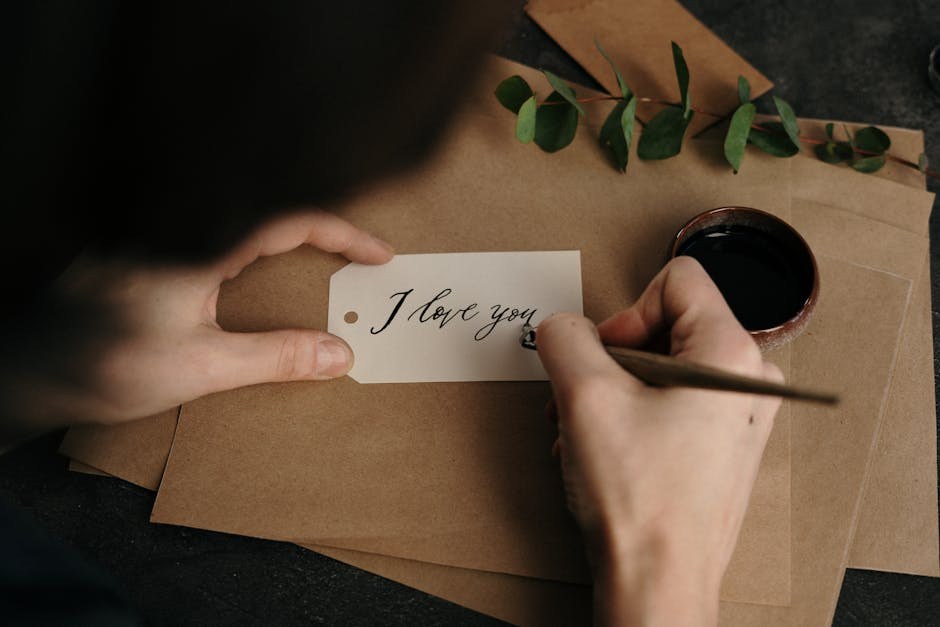Standing in front of the people you love is thrilling and terrifying – and that feeling intensifies the moment you realize the spotlight will fall on your own words. If you’re gearing up to write wedding vows that sound like you, feel true to your story, and still keep your guests engaged, you’re in the right place. What follows is a practical, reassuring guide that reshapes familiar advice into a clear process, so you can swap panic for purpose and arrive at the aisle with promises you’re proud to say out loud.
Before you even put pen to paper
Great writing rarely begins with perfect sentences; it begins with context and momentum. Give yourself a runway. Explore examples, notice what you like, and gather fragments of language from your daily life. The aim at this stage isn’t to finish – it’s to collect. You’ll soon refine those pieces into wedding vows that feel personal and polished.
A practical roadmap for writing
- Browse thoughtfully, then close the tabs. Read a variety of sample promises from different ceremonies: playful, minimalist, reflective, and tender. Notice the tone, not the exact wording. When your head starts echoing with other people’s phrases, stop. Step away from the screen so your own voice can rise to the surface and guide your wedding vows.
- Start early – much earlier than feels necessary. Set a soft deadline well before your wedding day. Time cushions reduce pressure and leave room for discovery, which is when the truest lines for your wedding vows usually appear.
- Collect sparks in a running note. Jot down memories, micro-moments, and inside phrases you say to one another. Don’t worry about order or grammar. Chaos now means clarity later because raw material makes revising your wedding vows much easier.
- Free-write without judgment. Give yourself ten undisturbed minutes to write continuously about why you’re choosing this person. Keep the pen moving – you can strike or shape later. Even a single sentence from this exercise may anchor your wedding vows.
- Choose a clear angle. Decide what your promises emphasize: devotion through ordinary days, support for dreams, humor that keeps you both grounded, or a blend. A deliberate angle keeps your wedding vows coherent, especially when nerves are high.
- Limit the story buffet. You’ve lived countless chapters together, but the ceremony isn’t the place for every anecdote. Select one vivid origin story or turning point. A focused scene is more memorable than a dozen references scattered through your wedding vows.
- Draft, then redraft – at least twice. The first version is a map; the second and third are the journey. Read each draft aloud, listening for rhythm, length, and tongue-twisters. Trim anything that sounds stiff so your wedding vows sound like conversation rather than a recitation.
- Mind the clock. Aim for the sweet spot that keeps guests attentive and your partner nourished by your words. Concise, intentional wedding vows feel generous – they honor the moment without dragging it.
- Invite one trusted reader. Ask a friend or relative with good instincts to review for clarity and tone. They’re listening for warmth, pacing, and unintended awkwardness. A quick outside pass can elevate your wedding vows from lovely to luminous.
- Balance intimacy with the room you’re in. Speak straight to your partner while remembering you’re sharing in front of family and friends. Reserve deeply private details for later; your wedding vows should be tender without oversharing.
- Keep your partner’s dignity intact. A playful story can charm, but anything that might embarrass your beloved – or reframe a painful memory – doesn’t belong here. Loving respect is the backbone of wedding vows.
- Practice out loud – standing up. Say every word at full voice. Mark pauses where emotion may swell. Notice where you stumble and adjust phrasing. Rehearsal builds muscle memory so you can deliver your wedding vows even if your heart is racing.
- Create a ceremony-ready copy. After revisions, write your final version on a clean card or in a small vow booklet. Line breaks help you breathe, and a physical script keeps you grounded when you speak your wedding vows.
- Guard the surprise. Tuck the pages somewhere safe and resist the urge to peek at your partner’s notes. Anticipation heightens the magic – hearing each other’s wedding vows for the first time at the altar is a singular joy.
Agree on boundaries together
Individual expression shines brighter when the two of you coordinate expectations. A quick conversation sets parameters and prevents tonal whiplash during the ceremony.

- Set a time range you both like. Choose a window that suits your style and ceremony flow. Mutual guardrails ensure neither of you feels rushed or overly long when sharing wedding vows.
- Decide how many inside jokes to include. A sprinkle shows personality; a torrent can exclude your guests. Align on a light touch so your wedding vows stay inclusive and warm.
- Pick a tone – or a blend. Will you be mostly sentimental, gently funny, or evenly mixed? Calibrating mood helps your wedding vows feel harmonized rather than mismatched.
- Discuss religious or traditional language. Choose the elements that reflect your values. A shared approach keeps your wedding vows consistent with the ceremony as a whole.
Lines and ideas you can adapt
You don’t need ornate language to move hearts. Simple, direct sentences often carry the most weight. Consider these seed ideas and reshape them in your voice.
- I can’t picture my life without you. This signals that your partner changed your everyday world for the better – a quiet declaration that belongs at the center of wedding vows.
- I will be gentle with your heart. Promise to protect the trust you’re given. Care is an active choice, and naming it gives your wedding vows a steady core.
- I choose you above every distraction. Affirming priority offers security. Said plainly, this line deepens the commitment inside your wedding vows.
- I look forward to all our ordinary days. Grand adventures are wonderful, but shared routines are where love takes root. Bringing this to your wedding vows honors the life you’ll actually live.
- I will meet frustration with patience. Marriage invites teamwork. Pledging patience turns conflict into an opportunity to care – an anchor promise for wedding vows.
- You bring light to my life. Acknowledge the joy they spark in you. Gratitude, spoken clearly, gives your wedding vows warmth without drifting into cliché.
- I’ll champion your hopes. Commit to showing up for their goals and cheering loudly. Supportive partnership belongs in wedding vows because it sustains love over decades.
- I will love the whole of you. Embrace quirks and imperfections and promise encouragement when courage runs thin. Acceptance is the abiding note of many meaningful wedding vows.
Shape your story with the past-present-future arc
When you feel stuck, structure sets you free. This simple arc helps you gather memories, gratitude, and promises into a flowing narrative.
- Past: how we arrived here. Recall one moment that changed everything – a first meeting, a long conversation, a quiet realization. One vivid scene can carry the emotional load of your wedding vows’ opening.
- Present: why I choose you now. Name the qualities that make sharing a life with this person feel inevitable and thrilling. This section answers the quiet question at the altar and grounds your wedding vows in today.
- Future: what I promise. Pull the thread forward. Offer concrete, everyday commitments – listening fully, laughing often, returning to kindness after conflict. These are the spine of wedding vows that age well.
Practical delivery tips for calm and clarity
Even seasoned speakers feel a tremor in moments that matter. Small adjustments make a big difference when you deliver your wedding vows.

- Mark your breath points. Add slashes or blank lines where you’ll pause. Breathing with intention steadies your voice and gives the meaning inside your wedding vows space to land.
- Slow down by design. When emotions run high, pace tends to race. Write “slow” in the margins as a friendly reminder to savor your wedding vows.
- Plant your feet, soften your shoulders. A grounded stance calms adrenaline. Comfortable posture lets the tenderness in your wedding vows come through.
- Keep tissues handy. Tears are welcome; preparedness keeps you from losing your place. A small pause can even deepen the impact of your wedding vows.
- Look up often. Eye contact with your partner turns words into connection. Glancing at the page and then returning to their face keeps your wedding vows intimate, even in a room full of people.
When inspiration stalls
Writer’s block doesn’t mean you’re out of love – it means your brain needs a gentler approach. Shift your state. Step outside, wash dishes, fold laundry, or bake something simple. Doing a tactile task gives your mind space to wander, and that’s when the truest sentences for your wedding vows often surface. You can also revisit saved messages, silly notes on the fridge, or that text thread where your shared sense of humor lives. Harvest language from your own life; it will always sound more authentic than anything you try to manufacture under pressure.
Another reliable reset is storytelling with a purpose. Ask yourself: when did I first realize this person was home? What ordinary habit of theirs makes my day brighter? Which challenge did we face that tightened our bond? Answering in a few plain sentences can seed entire sections of your wedding vows. Remember – perfection isn’t the target. Presence is. If the words feel true to you, they’re already good enough.
Borrowed words, used wisely
Sometimes language won’t carry the full weight of how you feel. That’s when many couples turn to poets and lyricists for a line or two that captures an emotion that resists paraphrase. If you include a borrowed fragment, keep it brief and contextualize it with your own thoughts. Let the quote serve your meaning rather than replace it. A tiny sparkle of literature can complement your wedding vows, but your voice should remain the star.

Keeping the moment inclusive
Your ceremony hosts many hearts: immediate family, dear friends, and guests from different corners of your lives. Consider them when shaping tone and references. The most inclusive wedding vows avoid jokes that require deep backstory, skip any commentary that might reopen old wounds, and steer clear of private shorthand that leaves listeners lost. Paradoxically, the more specific you are about genuine feelings – admiration, gratitude, commitment – the more universally your words will land.
Editing for music, not just meaning
Read your promises as if they’re a tiny piece of music. Listen for repeated sounds, for sentences that run too long, for clauses that feel tangled. Shorten, then vary. Follow a long sentence with a compact one. Replace a thicket of adjectives with a single precise noun. Wedding vows sing when the language has movement – a natural rise and fall that mirrors the way you speak when you’re fully yourself.
On nerves and authenticity
Butterflies don’t signal that you’re unprepared; they signal that you care. You’re not auditioning – you’re promising. If emotion catches in your throat, let it. If laughter bubbles up, welcome it. The point of wedding vows isn’t flawless delivery; it’s honest expression. Guests will remember how your words made them feel, not whether you pronounced every syllable perfectly.
A simple assembly template
If you like having a scaffold while composing, try this flexible template and customize freely:
- Opening line: Address your partner by name and name the moment. (“Today I stand with you…”) This centers your wedding vows immediately.
- One story: Choose a brief memory that reveals why your love deepened. Keep it to a few sentences so your wedding vows stay focused.
- Three qualities: Name the traits you cherish – generosity, steadiness, playfulness. Concrete language keeps your wedding vows vivid.
- Promises: Offer two to four commitments grounded in daily life. Specificity is the heartbeat of wedding vows.
- Closing line: End with a phrase that feels like a landing – a gentle, memorable cadence that seals your wedding vows.
Respecting tradition while making it yours
Maybe you adore the familiar cadence of “to have and to hold” and also want your personal voice in the ceremony. You can honor both. Keep a traditional exchange led by your officiant and add brief, individual wedding vows just before it. This structure blends continuity with originality, giving older relatives the comfort of ritual while giving the two of you a chance to speak directly to one another.
Staying present on the day
On the morning of the ceremony, read your words once – then put them away. Trust your preparation. Eat something. Hydrate. Arrive early enough to feel the space. When it’s time, breathe in for four counts and out for six. Look at your partner more than the page. If you lose your place, pause, smile, and begin again from the last complete sentence. Presence, not perfection, is what makes wedding vows unforgettable.
Frequently asked questions, reframed
- Can you write your own promises? Absolutely. Personal words add texture and meaning, turning a beautiful ceremony into your ceremony. Personalized wedding vows are a gift to your partner and to everyone witnessing your union.
- How long should they be? Long enough to say what matters, short enough to keep the moment bright. Most couples find a modest window serves both goals and keeps wedding vows resonant.
- How long does writing take? It varies. Some draft in a day; others shape lines over weeks. Start early so you can revise without pressure and let your wedding vows evolve naturally.
- Can you get help? Yes. Inspiration from literature, conversation with a trusted friend, or a quick sensitivity read can sharpen your voice while keeping your wedding vows unmistakably yours.
- Where do you write them? Anywhere you think best – notebook, phone, laptop. For the ceremony, prepare a tidy physical copy so you have a keepsake of your wedding vows afterward.
- What if you feel stuck? Take a break, move your body, recall a favorite shared moment, and return later. Thinking counts as writing. The right lines for your wedding vows often arrive when you’re not forcing them.
A closing word of courage
It’s tempting to default to a generic script when nerves spike, but you don’t need perfect poetry to make the moment meaningful. Speak plainly, love boldly, and trust that sincerity travels farther than flourish. With a bit of structure, a handful of small edits, and the courage to sound like yourself, your wedding vows will do exactly what they’re meant to do – reflect a love you’re ready to live, day after day.